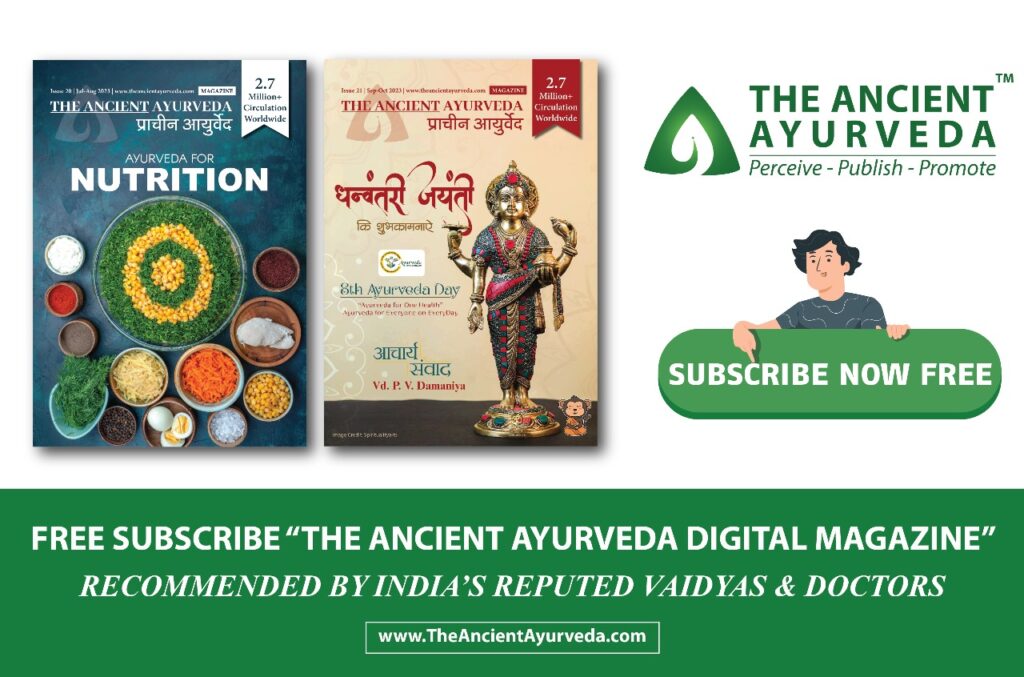Ayurveda is a philosophy of life which explained well about the health maintenance of eyes. Apart from the treatments, daily and seasonal regimens, Pathya-Apathya are the supportive measures for wellbeing. Many of the ancient Acharyas paid their special attention to dietary habits because considerable numbers of disease are depending on diet and the diet can be used as preventive measure as well. It has become extremely essential to take care of one’s eye with increased screen time after pandemic. While reducing exposure to blue light, practicing eye exercises it is equally important to add certain foods into diet which helps in making your eyes healthy. Maintaining a well-balanced diet is key to eyes health and may helping reducing risk for developing eye ailments. Serious eye conditions may be avoided if we include foods that contain a range of Vitamins, nutrients, and minerals. Eyes need many types of antioxidants to stay healthy. These include lutein, zeaxanthin, vitamin A, C, E, beta -carotene, omega -3 fatty acids, zinc. A balanced diet is best created with a variety of proteins, dairy products, fruits, and vegetables. Here, are some vegetables, medicine, fruits and dairy products which can be added to the routine diet.
Triphala Powder mixed with ghee and honey (in unequal dose) at night is good for health. However, consuming Triphala powder for long periods without proper consultation can be harmful for gut.
Amalaki (Indian Gooseberry) in which Vitamin C is in high percentage, almost 20 times more than orange; must be consumed daily in morning empty stomach. Vitamin C plays a significant role in maintaining integrity of retina and also promotes its vascular health. Amla is Chakshushya in nature and “An Amla a day keeps your eyes healthy”.
Shatavari (Asparagus) contains high amount of Vitamin B and E also many micronutrients and minerals which is extreme beneficial for maintaining eye health. Vitamin A, C and E are responsible for Lens and retinal defects such as cataract and Age-related macular diseases respectively.
Ghritapana (Plain cow’s ghee or medicated ghee) is good source for improving digestion, if taken in proper dose. Medicated properly formulated ghee (Mahatriphaladi ghrita, Jeevantyadi ghrita) if taken 1 tablespoon with glass of milk, is good for eyes. Also, Ghee kept in iron vessel is beneficial for visual impairments.
Matsya (Fish) are rich in Omega 3 fatty acids which are healthy fats. This fatty acid can contribute to visual development and the health of the retina in the back of the eye. They can also prevent dry eyes effectively.
Eggs are a great food to eat for eye health. The yolks contain Vitamin A, Lutein, zeaxanthin, and Zinc, which are all vital to eye health. Vitamin A safeguards the cornea. Lutein and zeaxanthin lower the chance of getting serious eye conditions like agerelated macular degeneration and cataracts. Zinc contributes to the health of the retina.
Dairy products such as milk and yogurt are good for the eyes. They contain Vitamin A as well as the mineral zinc. Dairy from grass fed cows provides the most benefits.
Saindhava Lavana (Rock Salt) is the only salt which is good for general as well as eye health. It is advisable to use rock salt in daily routine.
Raisins (Dried grape) contains the micronutrients which helps in getting rid of free radicals. Free radicals are harmful for vision and are the leading cause for degeneration of eye muscles and coats. Thus, adding 5-10 resins in daily routine helps to improve vision and overall health of the eyes.
Kramuk phala (Almonds) contains Vitamin E. This vitamin guards against unstable molecules that target healthy tissue. Consuming regular amounts of vitamin E can help prevent age related macular degeneration as well as cataracts.
Garjana (Carrots) are rich source of beta carotene and lutein, which are antioxidants that can help prevent eye damage caused by free radicals. Betacarotene is converted to vitamin A in our body, deficiency of which may lead to night blindness. Also, yellow carrots contain most lutein, which may help preventing degenerative diseases of eyes.
Shaka (Vegetables) mentioned in Ayurveda are Patola (Snake gourd), Sunishnaka (Water clove), Karvellaka (Bitter Gourd), Vartuka (Brinjal), Shigru (Drumsticks), Balamulaka (Raw raddish) should not be afraid of the dreadful visual impairments. Most of the bitter taste food belong to green leafy vegetables which contain antioxidants, Vitamin A and C.
Dhanya (Grains) such as Yava (Barley), Godhuma (Wheat), Shali and Shashtika Chawal (Brown rice), Kodo/ Kodrava (Ditch millet) is extreme beneficial for eyes if used one year old. These are containing high concentration of Vitamin A and Vitamin B. Person should take a balanced healthy diet which contains plenty of green leafy vegetables, fresh fruits and animal food products which will be helpful for preventive and curative of eye disease. Maintaining a well-balanced diet is key to eyes health and may helping reducing risk for developing eye ailments. Serious eye conditions may be avoided if we include foods that contain a range of Vitamins, nutrients, and minerals. A balanced diet is best created with a variety of proteins, dairy products, fruits, and vegetables.
“Your diet is bank account!
Good food choices are good investments!!”


